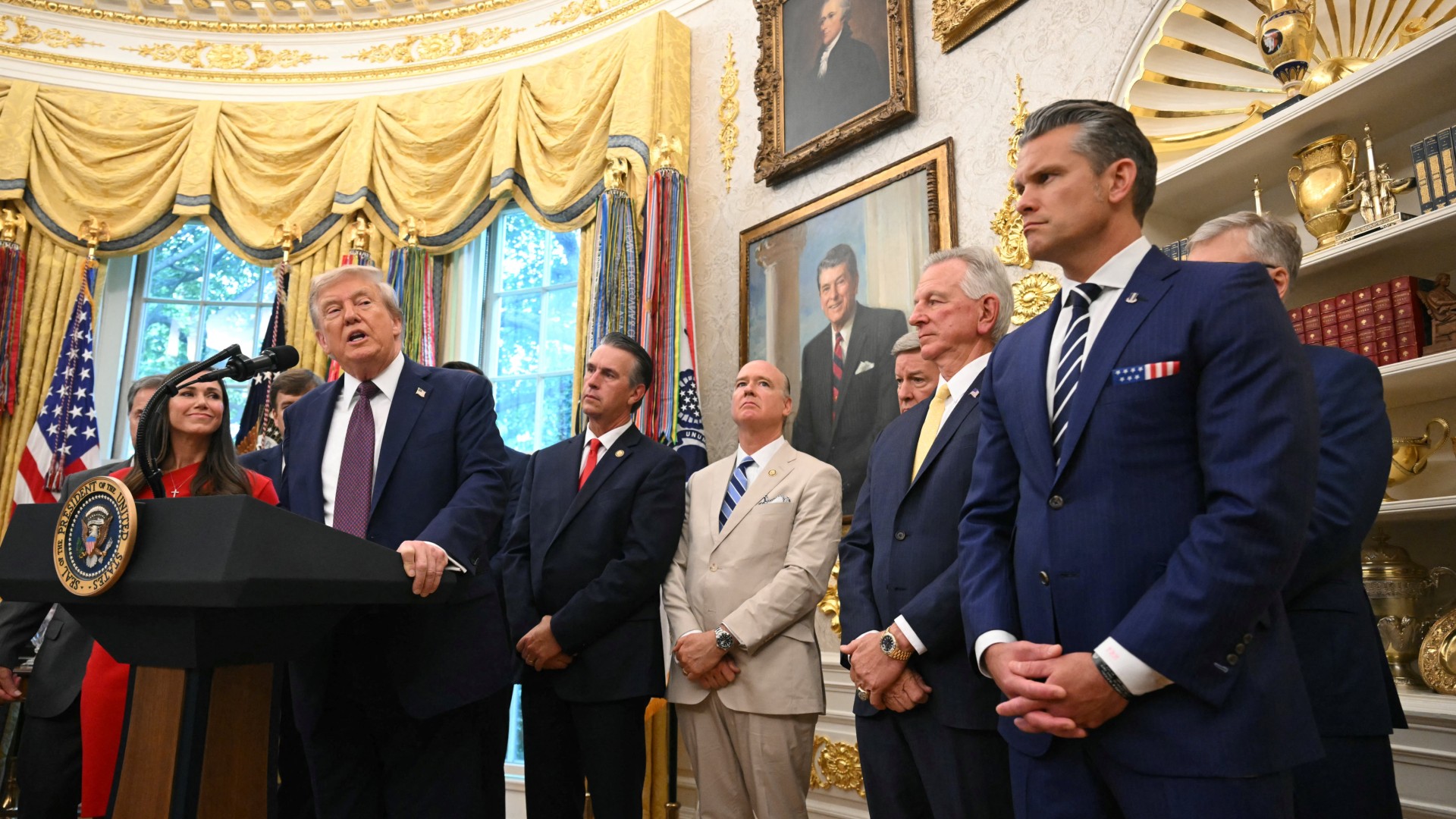Trump moves US Space Command to Alabama's 'Rocket City'
"We love Alabama. I only won it by about 47 points. I don't think that influenced my decision, right?"

Breaking space news, the latest updates on rocket launches, skywatching events and more!
You are now subscribed
Your newsletter sign-up was successful
Want to add more newsletters?
President Donald Trump just announced that U.S. Space Command will be relocated from Colorado to Huntsville, Alabama.
In an Oval Office press conference on Tuesday (Sept. 2), Trump stated that U.S. Space Command, which oversees space-based warfighting capabilities across the entire U.S. military, including the Space Force, will move to Alabama, reversing a decision by the previous presidential administration.
"I am thrilled to report that the U.S. Space Command headquarters will move to the beautiful locale of a place called Huntsville, Alabama, forever to be known from this point forward as 'Rocket City,'" Trump stated today, using a nickname that has long described Huntsville. "We love Alabama. I only won it by about 47 points. I don't think that influenced my decision, right?"
Trump added that Colorado's policy of sending every registered voter a mail-in ballot played into his decision to move Space Command.
"The problem I had with Colorado, one of the big problems, they do mail-in voting, they went to all mail-in voting, so they have automatically crooked elections. And we can't have that. When a state is for mail-in voting, that means they want dishonest elections, because that's what that means. So that played a big factor," Trump said.
Rather than using politics as justification, U.S. Secretary of Defense Pete Hegseth framed the move in terms of American superiority in space.
"We are way ahead in space, but this will ensure we stay leaps and bounds ahead, because that's the most important domain. Whoever controls the skies will control the future of warfare," Hegseth said.
Breaking space news, the latest updates on rocket launches, skywatching events and more!
U.S. senator and former college football coach Tommy Tuberville (R-Alabama) added during the press conference that the new headquarters may be named after Trump.
"We need help in our military. We need to catch up, and as the secretary said, we we're not behind in space, but we know where we're at," Tuberville said. "So thank you, Mr. President, for this, and we look forward to building a huge space command and having the Donald J. Trump Space Command Center in Huntsville, Alabama."

President Joe Biden's administration named Colorado Springs, Colorado as the location for U.S. Space Command. Colorado Springs is home to Peterson Space Force Base, the current home of U.S. Space Command, in addition to Schriever Space Force Base and the United States Air Force Academy, which trains officers for the U.S. Space Force.
Huntsville, Alabama has long been known as "Rocket City," owing to the fact that some of the U.S. military's earliest rockets and ballistic missiles (essentially rockets designed to be used as weapons) were built and tested at the U.S. Army's Redstone Arsenal in Huntsville.
The Army Ballistic Missile Agency (ABMA) was founded in 1956 at Redstone, and, under the direction of legendary rocket scientist and former Nazi Party member Wernher von Braun, developed the PGM-11 Redstone, the first American missile to carry a live nuclear warhead. The Redstone rocket family would lead to the development of the Juno I rocket, which launched the first American satellite, and the Mercury-Redstone launch vehicle, used to send America's first astronauts into space.
In 1960, President Dwight D. Eisenhower established NASA's Marshall Space Flight Center at Redstone and appointed von Braun as its first director. The Saturn family of rockets, which launched the Apollo astronauts to the moon, were developed at Marshall in Huntsville.
Today, Redstone Arsenal is home to the Missile Defense Agency and the Missile and Space Intelligence Center. Many U.S. aerospace companies also call Huntsville home; Blue Origin runs an engine factory in the area, and contracting giants Lockheed Martin Space and Northrop Grumman also have facilities in Huntsville. Both companies are vying for contracts in Trump's "Golden Dome" missile defense initiative.

Brett is curious about emerging aerospace technologies, alternative launch concepts, military space developments and uncrewed aircraft systems. Brett's work has appeared on Scientific American, The War Zone, Popular Science, the History Channel, Science Discovery and more. Brett has degrees from Clemson University and the University of North Carolina at Charlotte. In his free time, Brett enjoys skywatching throughout the dark skies of the Appalachian mountains.
You must confirm your public display name before commenting
Please logout and then login again, you will then be prompted to enter your display name.
